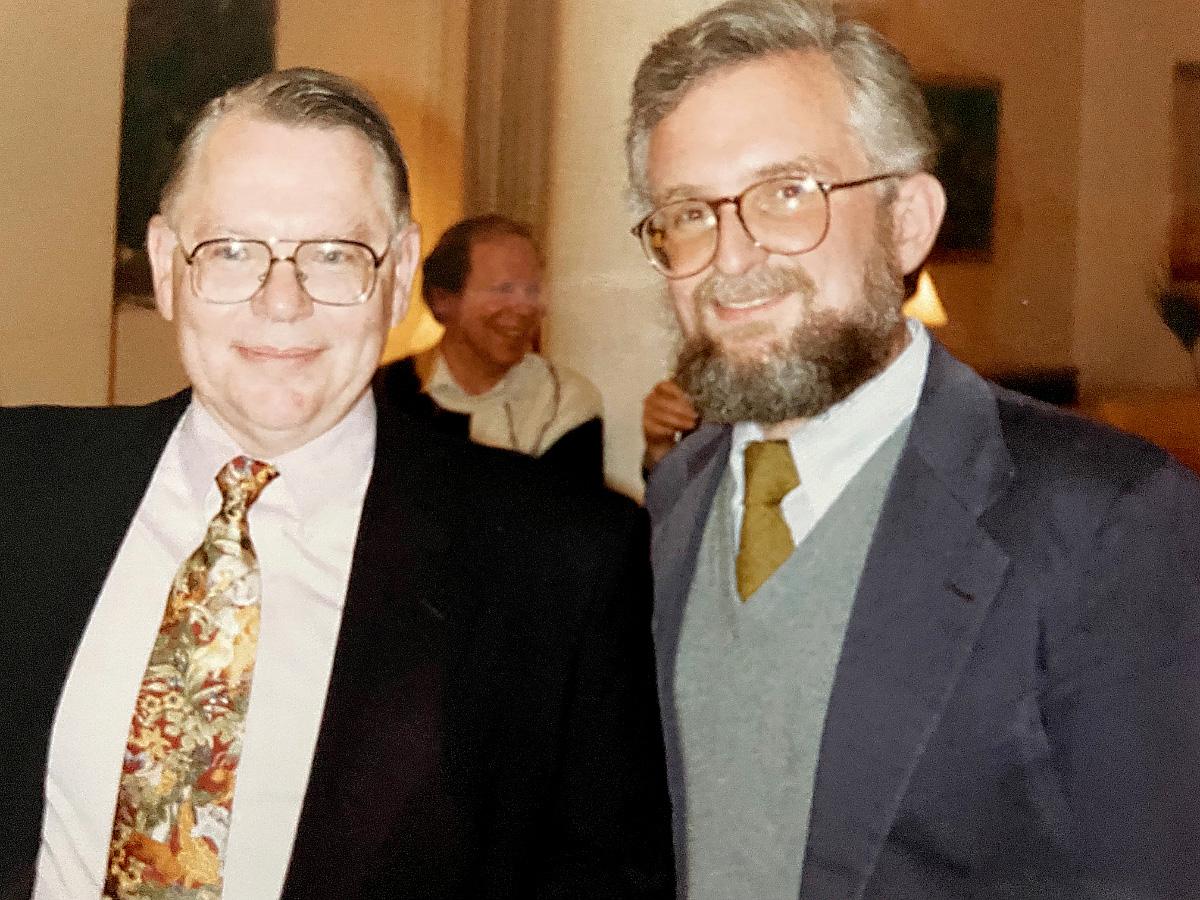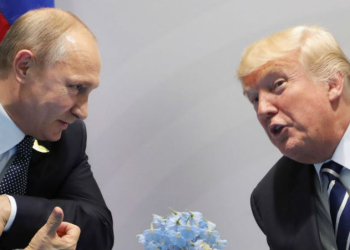A now-legendary but long-secret 70-paragraph telegram written by the top political analyst at the U.S. Embassy in Moscow in March 1994, E. Wayne Merry, criticizing the American policy focus on radical economic reform in Russia, was published in full today for the first time by the National Security Archive.
Merry could not get the critical message cleared for government-wide distribution at the time in 1994 because of Treasury objections (“It would give Larry Summers a heart attack”) and ultimately resorted to the Dissent Channel instead, according to Merry’s retrospective commentary, which was also published today by the Archive together with the actual “long telegram” and other declassified documents.
Reminiscent of George Kennan’s Long Telegram of 1946 in the depth and scope of its analysis of Russian realities and almost as prescient in its prophecies, the Merry cable only reached the public domain as the result of a National Security Archive lawsuit under the Freedom of Information Act (FOIA). The State Department denied a copy to Merry himself, claiming public release of dissent messages would provide the wrong incentive for future Foreign Service Officers.
Titled provocatively “Whose Russia Is It Anyway? Toward a Policy of Benign Respect,” the Merry long telegram argued that radical market reform was the wrong economic prescription for Russia, with its history of statist direction of the economy, uncertainty of political transition and extreme challenges of geography and climate. The message described “shock therapy” as so visibly Washington’s program that the devastating austerity already evident in 1994 was blamed on the U.S., and the long-term consequences would “recreate an adversarial relationship between Russia and the West.” Plus, Merry warned, “we will also fail on the economic front.”
The one-page official response from the State Department, required by State regulations to come from the Policy Planning Staff, did not even reach Moscow until Merry had already left the Embassy that summer. Merry read the formal response for the first time only this year, after the National Security Archive obtained both his original Dissent Channel cable and the State response as part of a FOIA lawsuit. The State response, signed by then Director of Policy Planning Jim Steinberg, commended Merry for his constructive use of the Dissent Channel, accepted some of his criticisms of U.S. aid programs in Russia, but, in a tone-deaf passage displaying no knowledge of Russia, told him he was wrong to separate markets from democracy as policy goals, because the former were essential to the latter.

Courtesy of Wayne Merry.
Top political officer predicted U.S. focus on markets over democratic institution-building
would turn Russia anti-American and “adversarial”
National Security Archive wins release of long-withheld cable through FOIA lawsuit
“In my experience, Washington seeks to understand other countries by looking in the mirror (a common human failing),” comments Merry in his contextual essay. He describes American policy toward Russia in the 1990s, emphasizing market reforms rather than building democratic institutions and the rule of law, as an “especially virulent case of Washington institutions trying to ram a foreign square peg into an American round hole.”
The Merry long telegram provided Washington with a detailed dissection of the political forces at work in Russia, the weakness of the radical reformers both electorally and going forward, the rationale behind Russian President Boris Yeltsin’s firing of key reformers (not at all welcomed in Washington), and an extended economic history lesson on Russian realities.
Russians were baffled by the American “double helix” concept of markets and democracy as mutually dependent and leading to a “higher moral and material state of being,” wrote Merry in 1994. “Very, very few Russians impart positive ethical content to market forces, and unfortunately more of these are Mafia than economists.” Merry warned Washington that the radical reformers deserved to lose the December 1993 elections, “lost it badly, and lost it fair and square.” After all, “the only way to know what the people want, and don’t want, is to ask them.”
One particularly critical passage of the long telegram eviscerated U.S. aid programs. “Sadly, very few of the multitudes of American ‘advisors’ in Russia since the Bolshevik demise acquainted themselves with even the most basic facts of the country whose destiny they proposed to shape… Even the most progressive and sympathetic of Russian officials have lost patience with the endless procession of what they call ‘assistance tourists’ who rarely bother to ask their hosts for an appraisal of Russian needs….” And since “our aid programs are often of benefit mostly to domestic contractors” – particularly so in this case – “much of the assistance money never left our shores or ever entered Russian hands.”
Other declassified documents included in today’s Electronic Briefing Book provide evidence of Merry’s flair for writing and colorful analysis, often appreciated by his superiors, especially Ambassadors Robert Strauss and Thomas Pickering, and DCM’s James Collins and Richard Miles, whom Merry singles out for praise in his contextual essay.
For example, Merry wrote the briefing to Washington just before Yeltsin came to Camp David to meet George H.W. Bush in January 1992. The cable bearing Strauss’s signature (standard practice) reported, “Yeltsin will continue to struggle with the results of the imperial breakup he helped bring about and with the garrison state he inherited.” But the Russian people don’t want another Lenin, just “a tsar with a common touch.” At the bottom of this cable, Strauss added a comment: “While this analysis may be overdrawn a bit at the margins, we wanted to make the points vividly and responsibly.” This phrase describes almost all of Wayne Merry’s reporting from Moscow in the 1990s.
THE DOCUMENTS
Document 1
Department of State, National Security Archive FOIA Lawsuit
This cable, written by Wayne Merry as a Dissent Channel message, reminds one of the famous Long Telegram written by George Kennan in 1946 in its analytical power and predictive precision. He expresses his disapproval of the U.S. attempts to impose its vision of radical economic reform on an unwilling Russia. The cable analyzes Russian political landscape after the Duma elections of December 1993, where, in Merry’s description, “the radicals lost a general election, lost it badly, and lost it fair and square.” He gives vivid portraits of leading Russian economic reformers Yegor Gaidar and Boris Fedorov, explains the success of anti-Yeltsin forces, the pain of reforms, and the growing “frustration tonged with animosity” toward the West on the part of the population. Merry warns his government that if the present U.S. policy to Russia continues, it will “assist Russian extremists to undermine the country’s nascent democracy and will encourage a renewal of Russia’s adversarial stance toward the outside world.”
Document 2
Department of State, National Security Archive FOIA Lawsuit
Almost six months after the dissent message is written and almost three months after Wayne Merry left the Moscow Embassy, comes a one-page polite response from Director of Policy Planning Jim Steinberg . The author of the dissent cable would never receive it. Steinberg expresses his general agreement with the cable but then actually rebuts Merry’s criticisms of U.S. policy. He insists on the linkage between free markets and democracy, seeing economic reform as the only path to democracy in post-communist states. He denies that the United States “pressed Russia for radical economic reform,” insisting that it was simply what “political circumstances would permit.” In the end, he concludes that, although some deficiencies in U.S. policy would be corrected, support for economic reform should continue.
Document 3
Department of State, National Security Archive FOIA
On the eve of Yeltsin’s visit to Washington, U.S. Embassy Moscow offers a perceptive assessment of the Russian leader signed by Ambassador Robert Strauss but written by the head of the political-internal section Wayne Merry. He emphasizes Yeltsin’s impressive popularity even as his economic reform is producing real hardships. Merry concludes that “Yeltsin’s popular mandate is real” and that he “see[s] no credible substitutes” to the current leader. The cable notes how the lack of communication between the president and the parliament had resulted in “a degree of resentment in the parliament of the dominating—and often domineering—figure of the Russian president” but not real organized opposition. Moscow is not the real center of everything any longer. To the contrary, “[m]ost reformers in Russia and other parts of the former Soviet Union are looking abroad rather than to Moscow for guidance, for models, for partnerships,” and so the fate of reform will be decided in the provinces.
The U.S. diplomat notes that the only force in Russia capable of removing Yeltsin and reversing the reform is the Army—”Yeltsin’s most difficult domestic challenge is the future of the armed forces.” The Russian president is keenly aware of the “deeply dissatisfied officer corps” lamenting the “loss of empire and mission.” Some of his nationalist and militant statements were directed at precisely this audience. The cable mentions the artificial nature and the fragility of the Commonwealth of Independent States, which in Merry’s opinion, “is not a successor union to the former USSR; it is little more than a legal framework.”
The cable offers an unusually candid portrait of Yeltsin’s personality, describing it as “cyclonic,” and Yeltsin as someone who is “at his best when standing on a tank” not dealing with daily governing tasks. While calling for the U.S. to fully support Yeltsin, the reformer, Merry concludes that “[b]y background and temperament, Yeltsin seems curiously unsuited to the job of leading an autocratic society toward a democratic future, but he seems determined that the job be done and be done by none other than himself.” And yet, he is most likely to succeed because, as the cable states, “[t]he Russian people do not want another Lenin at their head; they want a tsar with a common touch. In Yeltsin they have one.”
Document 4
Department of State Declassification, Date/Case ID; 6 MAR 2003 200001030
The Embassy sends Secretary Christopher a briefing cable in advance of his visit to Moscow where he is expected to meet with Yeltsin and other government officials. The cable is signed by Chargé d’Affaires and future Ambassador to Russia James Collins but written by head of the political-internal section Wayne Merry. This is the first visit of any Western senior official to Moscow after Yeltsin’s dissolution of the Parliament and the October 3-4 bloodshed in the center of Moscow. In the cable, Merry describes the pre-electoral landscape in Russia on the eve of Christopher’s visit. Although 92 parties are registered for the election, that in itself does not guarantee free and fair elections.
The cable describes Yeltsin’s decision to push through the new “half-baked” Constitution, which concentrates the “preponderance of authority in the hands of the chief executive.” Merry points out that “even many reformers worry about establishing a new Russian democracy so heavily tilted toward presidential power.” The cable describes the split within the reformist camp into “radical” and “cautious” reformers, the confusion at the regional levels regarding whether the elections would be held for regional legislatures, and the continuing ban on nationalist and right-wing parties and their newspapers.
Merry notes the personal nature of the confrontation: “Boris Yeltsin’s face during his October 6 speech was proof the Russian President had cast his hardline opponents into a personal anathema.” He also raises concern about the methods used by Moscow police and city government in implementing the state of emergency, such as “systematic police cleansing of non-Russian people from Central Asian and Caucasian states,” and racist remarks about dark-skinned people by Moscow Mayor Yuri Luzhkov. In the end of the cable, Merry cautions that although the actual voting is likely to be fair, “the question will be the democratic content of the entire electoral process.”
Document 5



























Discussion about this post